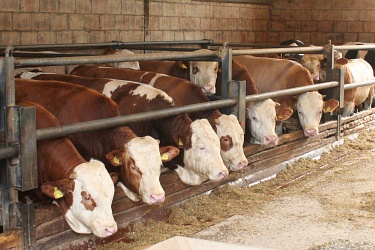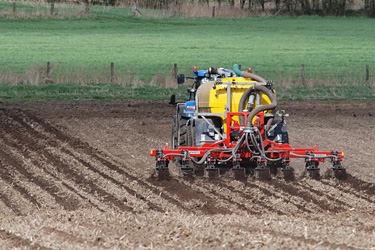E7 - Agriculture in West Münsterland in a conflict between animal husbandry, land usage and water protection – practical feasibility



Description of the region
The parklands of West Münsterland are deeply influenced by agriculture. Intensive animal husbandry has become the predominant method of cultivation in the districts of Borken, Coesfeld and Recklinghausen. A well-developed upstream and downstream section support agricultural and horticultural companies. The variety of special crops, such as vegetables, potatoes and strawberries, creates a high level of competition in the struggle for cultivation areas. Construction sites, industrial parks, roads, compensation areas, nature reserves, water and soil protection areas also increase land usage.
Water protection exemplified by the “Steverkooperation“
The cooperation between the water industry and agriculture started in the 1980’s and has proven to be successful, especially in the protection of surface water. It requires a complex interaction between counsellors, farmers and operators of water facilities. This cooperation aims to balance the conflicting economic goals of farmers and the reasonable interests defended by the public and water utility managers.
IGLO – more than just spinach
Since the 1960’s, IGLO has been associated with the industrial processing and commercialisation of vegetables. The production site in Reken, Borken district, does not only process about 40,000 tons of spinach per year, but also many other types of vegetables and herbs. Many local farmer families and companies sell their produce to IGLO. Counsellors are requested to support both local companies and IGLO in the conflict between product quality, climate conditions, water/soil protection and markets.
Wild horses in “Merfelder Bruch“ – fine traditions and the protection of endangered breeds
One of the interregional events is the annual catch of wild horses in Merfeld near Dülmen, Coesfeld district, on the last Saturday in May. First, colts are selected from a large herd of 300 horses. After that, the animals will be auctioned in front of an audience. The duke of Croey keeps this herd on an area of approximately 350 hectares located in “Merfelder Bruch“. It serves as a sanctuary to shelter this breed of wild horses. The area can be visited on demand. Relevant tours are available.
Guide: Ludger Rövekamp, Agricultural Chamber of North Rhine-Westphalia


 De
De